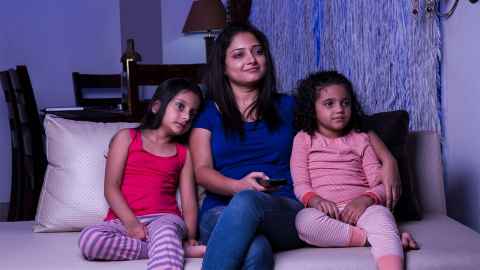Māori TV changes migrants’ views on Māori
16 December 2019
Opinion: Public broadcasters such as Māori TV have an important role in changing negative ideas held by some new migrants about Māori, writes Susan Nemec.

It would not be surprising if some new migrants have fairly negative ideas about Māori. Mainstream media do not help much in the way Māori stories are often framed, nor do the racist attitudes expressed in the everyday language of some Pākehā.
In contrast, Māori Television represents indigenous history, culture, contemporary issues and concerns from a Māori point of view. If new migrants do adopt negative attitudes towards Māori they can potentially be turned around after engaging with a Māori voice on Māori Television.
Research conducted with a group of Chinese, Indian, Eastern European and a Western European group of relatively new migrants showed that their experience of Māori Television has the potential to change their attitudes.
At the beginning of my research one of the participants told me that when she first arrived in New Zealand she thought that “Māori were sad, bad and a bunch of losers”. Another said, “To be honest with you, many of us don’t want anything to do with Māori, as they are seen as criminals.” However, these views changed after watching Māori Television and stories about the successful realities of Māori lives.
Participants became supportive toward te reo, paying attention to pronunciation, learning to use te reo words, and speaking Māori. Many developed an understanding of how breaches of the Treaty have resulted in the social deprivation experienced by many Māori. They also developed supportive attitudes towards Māori issues concerning the Treaty of Waitangi (te tiriti o Waitangi) . Viewing Māori Television led to some participants discovering a sense of cultural connection with Māori cultural values. Finally, participants felt engaged with the Māori world and became more supportive to building positive relationships with Māori.
The issue is that linear television is increasingly under threat as audiences fragment through digital technologies. That threat underpins the proposed replacement of RNZ and TVNZ to form a single public media entity to preserve public broadcasting in a time of digital disruption.
To know there is a strong Māori voice in Aotearoa/New Zealand should be important to the approximately 40,000 migrants who are granted permanent residency each year.
Māori Television has a statutory role to promote and protect Māori language and culture, but the extent to which Māori Television also plays a role as a public broadcaster in offering an indigenous perspective to the nation needs to be considered in the future shape of public broadcasting.
To know there is a strong Māori voice in Aotearoa/New Zealand should be important to the approximately 40,000 migrants who are granted permanent residency each year. The majority of these turn to the media for information about New Zealand culture and society. However, New Zealand media predominantly represents a Pākehā world view. So it is understandable that migrants fall victim to the assumption that ‘fitting-in’ in New Zealand means becoming like Pākehā.
How are migrants going to understand the country they have chosen to call home when there are so few opportunities offered to learn about the history and contemporary context of Māori and Pākehā relations? What opportunities are available for migrants to learn about the Treaty and the relationship of equality it envisioned between Māori and the Crown? Where do migrants belong within a bicultural framework and how do they learn that under te Tiriti they are included, as are Pākehā, as tangata tiriti, people of the Treaty? These perspectives are often not offered to new migrants, which in turn reduces their ability to engage in civic society.
New migrants need information to negotiate and weigh up important tensions and polarities, and multiple perspectives that are inherent to democratic living and problem solving. This is critical because changes in the nation’s multi-ethnic demographic [can] build pressure to reimagine both national and migrant identities in the context of a society founded on a Treaty that promised Māori self-determination.
The challenge for Māori Television is how to embrace digital technologies to reach wider audiences and draw these digital audiences into an experience of a distinctive Māori worldview. NZ on Air has been funding digital content and more recently, some of its digital initiatives reflect the harnessing of such technologies to provide much needed stories from Māori perspectives on Radio New Zealand and other content providers.
Content including The New Zealand Wars, New Zealand History and What it means to be Pākehā (in relation to Māori) are all available on digital platforms. However, none of these one-off stories offer an overall experience of te ao Māori that migrant audiences experience from watching Māori Televison. Indeed, migrants who watch Māori Televison do so through a different lens to Pākehā audiences, interpreting the culturally imbued content in diverse ways.
Funding bodies need to factor in how publicly funded content contributes to migrant settlement by offering an understanding of the assertion of indigeneity in Aotearoa. Whether the answer is to increase the funding of Māori Television, or to provide the resources to create distinctively Māori digital platforms available on migrants’ digital media should be addressed. At the very least Immigration New Zealand should be adding information on Māori Television and other relevant publicly funded programming from other platforms on its website.
Susan Nemec is a doctoral graduate in Media and Communication in the Faculty of Arts.
This article reflects the opinion of the author and not necessarily the views of the University of Auckland.
Used with permission from Newsroom Māori TV changes migrants’ views on Māori 16 December 2019.
Media queries
Alison Sims | Research Communications Editor
DDI 09 923 4953
Mob 021 249 0089
Email alison.sims@auckland.ac.nz